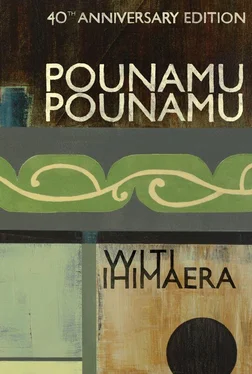I’ve also been thrilled to take the opportunity, in this Anniversary publication, to provide a historical and personal context to the book. I’ve gone back in my memory to the times when I began writing, the 1970s, and provided notes on how the stories all originated. More importantly, I’ve returned in my memory to Waituhi, all my whanau, to show how both they and Waituhi illuminated my life. They gave me a place and a people to write about; without them there would have been no Pounamu Pounamu or, even, a writing career. The notes follow the stories. I hope you enjoy them.
The stories in Pounamu Pounamu are about resilience, survival, facing and surmounting challenges and carrying on. My father liked to say to me, during the many times I was ready to give up, ‘You are a seed planted at Raiatea! Your ancestors didn’t paddle their canoes all that way across the ocean and settle in Aotearoa just to see you strand them in the second millennium! Strike out for the horizon! Paddle on! Their journey won’t be over until we reach the stars!’
This edition of Pounamu Pounamu is dedicated to that unending quest for the fulfilment of dreams that began long before any of us were born.
You are from a seed that was sown in Rangiatea and you will never be lost

Witi Ihimaera
The train pulled into the station. For a moment there was confusion: a voice blaring over the loudspeaker system, people getting off the train, the bustling and shoving of the crowd on the platform.
Then, there was Dad, waiting for me. We hugged each other; we hadn’t seen each other for a long time. But I could tell something was wrong.
‘Your Nani Miro,’ he said. ‘She’s very sick.’
Among all my kuia, Nani Miro was the one I loved most. It wasn’t one way either: everybody used to say I was her favourite mokopuna, and that she loved me more than her own children who’d grown up and had kids of their own. She lived down the road from us next to Rongopai meeting house in the old homestead which everybody in Waituhi called ‘Miro’s Museum’ because it housed the prized possessions of the whanau — the feather cloaks, greenstone ornaments, and the shields and trophies which Waituhi had won in sports and culture tournaments. As children we always used to think she was rich because she owned the most shares in what remained of our tribal land. We wondered why she didn’t buy a newer, more modern house. But Nani wasn’t thinking of moving.
‘Anyway,’ she used to say, ‘what with all my haddit kids and their haddit kids and all this haddit whanau being broke all the time and asking me for money, what have I got left to buy a new house with?’
The truth was, that Nani liked her old homestead just as it was and didn’t really care about money either.
‘Who needs it?’ she used to ask. ‘What you think I had all my kids for, eh? What you think I have all my mokopuna for! To look after me, I’m not dumb!’
Then she would laugh to herself. But it wasn’t true, really, because her family would send their kids to her place when they were broke and she looked after them! She liked her mokopuna, but not for too long. She’d ring up their parents and say:
‘When you coming to pick up your hoha kids! They’re wrecking the place!’
I used to like going to Nani’s place with the rest of my cousins. In particular, I looked forward to Saturdays because that’s when all the women would take the day off, and turn up to play cards. Nani loved all card games — five hundred, poker, canasta, pontoon, whist, hearts, euchre — you name it, she could play it.
The sitting room would be crowded with the women. There they’d be, dressed in their best clothes, sitting at various tables among the sports trophies and photographs, the carvings and greenstone. In those days, Maori used to be heavy smokers, so the women would all be puffing clouds of smoke, laughing and joking and gossiping about who was pregnant — and relishing all the juicy bits too.
Nani Miro was always at what was called ‘the top table’, reserved for the best players. Both she and Mrs Heta were the unrivalled champions and when it came to cards Mrs Heta, whose first name was Maka, was both Nani’s best friend and worst enemy.
‘You ready to be taken down?’ Mrs Heta would ask. ‘Oh, the cards are really talking to me today.’
‘Is that so, Maka?’ Nani would answer. ‘We’ll have to see about that, won’t we?’
The women would begin to play cards. No doubt about it: Nani Miro and Mrs Heta were the queens of the game. They also happened, whenever they didn’t have the right cards, to be the biggest cheats I ever saw.
Mrs Heta would cough and reach for a hanky while slyly slipping a card she wanted from beneath her dress. You never saw anybody reneging as much as she did in five hundred — and expecting to get away with it! But her greatest asset was her eyes which were big and googly. One eye would look straight ahead while the other swivelled around, having a look at the cards in the hands of the women sitting next to her.
‘Eeee! You cheat,’ Nani would say. ‘You just keep your eyes to yourself, Maka tiko bum.’
Mrs Heta would look at Nani, highly offended. Then she would sniff and say, ‘You the cheat yourself, Miro Mananui. I saw you sneaking that ace from the bottom of the pack.’
‘How come you know I got an ace, Maka?’ Nani would say. ‘I know you! You dealt this hand, and you stuck that ace down there for yourself, you cheat! Well, ana! I got it now! So take that!’ She would slap down her hand. ‘Sweet, eh?’ she would laugh. ‘Good? Kapai?’ Sometimes she would do a little hula, making her victory sweeter.
‘Eeee, Miro!’ Mrs Heta would reply. ‘Well, I got a good hand too!’
And she would slap her hand down and bellow with laughter.
‘Take that!’
And always they would squabble. I often wondered how they ever remained friends. The names they called each other!
Sometimes, I would go and see Nani Miro when she was by herself, playing patience. That was her game whenever there was nobody around to play with her. And still she cheated! I’d watch her hands fumbling across the cards. I’d hear her say, ‘Oops,’ as she turned up a jack or queen she needed, and I’d join her laugh of triumph: ‘See, mokopuna? I’m too good for this game!’
Nani used to try to teach me some of the games, but I wasn’t very interested.
‘How are you going to do good things for your people if you can’t concentrate?’ she would ask. ‘Here I am, counting on you to get a good education so that you can get the rest of our land back and you’re just hopeless, he hoha koe —’
Not only that, but I didn’t yell and shout at her like the women did. She liked the bickering.
‘Aue,’ she would sigh. Then she’d look at me, offer words of wisdom that didn’t make sense like, ‘Don’t let me down,’ or ‘If you can’t beat the Pakeha one way remember that all’s fair in love — or cards,’ and deal out the cards in the only game I ever knew how to play.
‘Snap!’ I would yell as she let me win.
Now, my kuia was sick.
I went to see Nani Miro that afternoon after I’d dropped my suitcase at home. The koroua, Nani Tama, her long-suffering husband, opened the door. We embraced and he began to weep on my shoulder.
‘You talk to her, moko,’ he said. ‘She walked out of the hospital yesterday. She should go back there. It’s no use me trying to persuade her; she’s still as stubborn as, never listened to anything I say. But you —’
‘I’ll do my best,’ I answered.
Читать дальше













